Lightweights for the Win! Local Wine Producers Crack Down on Heavy Bottles
Warning: Undefined variable $author_id in /home/rxlgpodj/domains/test10.co.za/public_html/C/wp-content/themes/crushmag/general-template.php on line 28
Heavier bottles, though they may feel luxurious or hint at high quality, carry a greater carbon footprint than their lighter counterparts – something that more local and international wine producers are considering as they try to phase out heavy bottles.
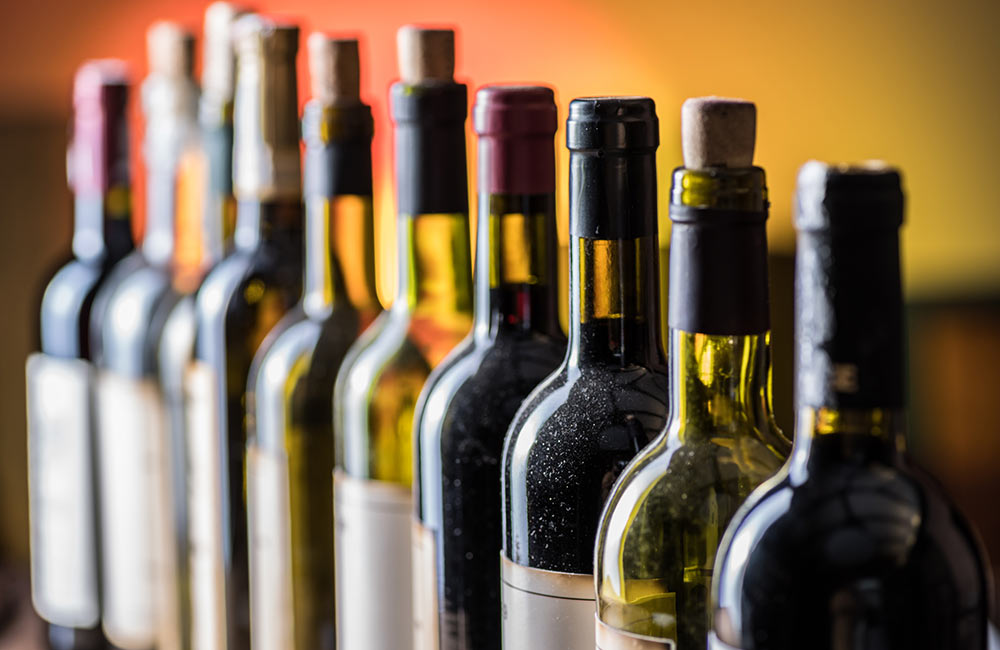
Some wineries are rethinking packaging altogether. Certain producers are investing in lightweight, eco-friendly bottle designs…
Heavy-handed Carbon Footprint
When picking up a bottle of wine, most people focus on the label design or the tasting notes promised within. Rarely do we consider the weight of the bottle, yet this often-overlooked detail has a substantial environmental impact.
It’s all linked to production. Heavier bottles require more raw materials, particularly glass, which demands significant energy to produce. Additional fuel is required for transportation due to the increased weight, resulting in higher greenhouse gas emissions every step of the way, from winery to warehouse to wine lover.
Transportation is one of the biggest contributors to this elevated carbon footprint. Simply put, the more a truck, ship or aeroplane carries, the more fuel it consumes, and heavy wine bottles take up more of these valuable resources. And for an industry that ships globally, this quickly becomes an issue on a large scale. While heavy bottles might create an impression of elegance, their environmental toll is increasingly at odds with the growing trend of conscious consumerism and sustainability practices.
Less Is More!
Thankfully, it’s not just up for debate – some forward-thinking wine estates and manufacturers are actively seeking solutions. Many are embracing lighter bottles, which reduce the amount of raw material required and lower transportation emissions.
Some wineries are rethinking packaging altogether. Certain producers are investing in lightweight, eco-friendly bottle designs and exploring alternative packaging formats, like cans or eco-cartons, which have a smaller carbon footprint and are easier to recycle. Others are creating closed-loop systems by working with glass manufacturers who use high percentages of recycled materials, reducing the need for new glass.
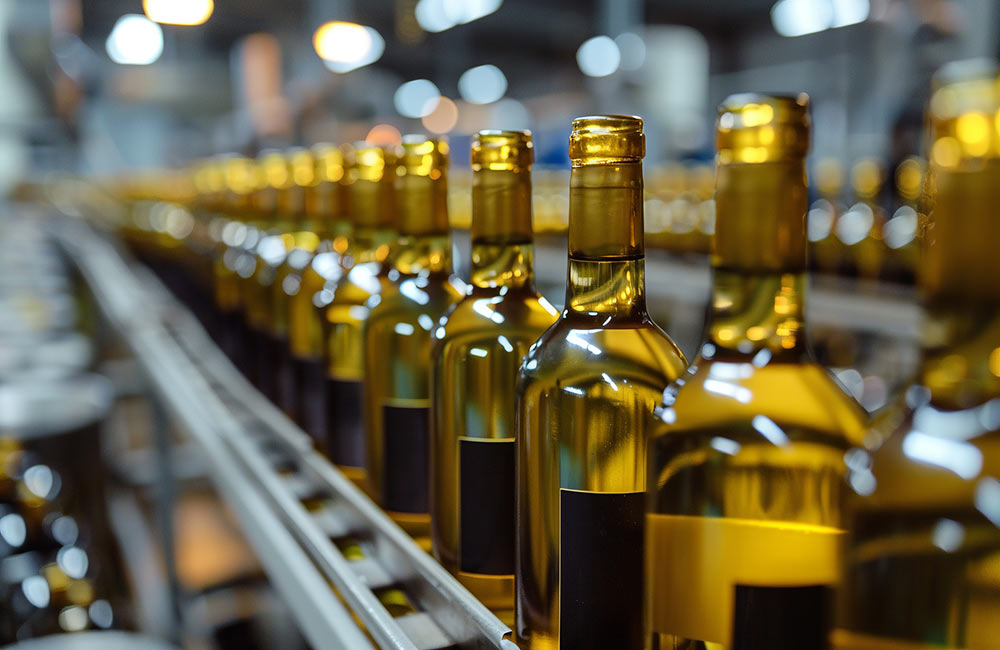
… lighter bottle formats don’t impact the quality of wines…
“From an environmental perspective, the benefits of lighter bottles are significant. The bottle in which wine is packaged accounts for as much as half of the total environmental impact of wine as a product. The proposed reduction in bottle weights from a current average of about 550g to the proposed 420g represents a more than 25% saving in carbon emissions,” as mentioned in the 2023 report by the Sustainable Wine Roundtable (SWR).
The weight of a standard 750ml bottle of wine you would buy at your local bottle store is approximately 550g, however, some international manufacturers are pushing for the lowest possible safe weighting, 330g for still wines.
How the Industry Is Lightening the Load
Wineries are teaming up with industry associations and sustainability coalitions to advocate for and educate on greener practices. Organisations like the International Wineries for Climate Action (IWCA) bring wineries together to set industry-wide carbon reduction goals, promote the use of eco-friendly packaging and encourage transparency in carbon reporting. This collective effort demonstrates a shared commitment to sustainability, one that emphasises the idea that premium wine doesn’t have to come at the environment’s expense.
In July 2024, ImpactSA reported that The Winery of Good Hope, Radford Dale’s sister wine label, re-launched their lighter bottles; the standard 750ml now weighs 410g per bottle. Obikwa wines, which claim to be one of the first local wine producers to adopt lightweight bottles, also switched to the 350g ultra-lightweight green bottles, which are about 25% lighter compared to standard bottles, say sources.
… their environmental toll is increasingly at odds with the growing trend of conscious consumerism and sustainability practices.
Last year, Journey’s End and Interpunkt launched their wine range, which is sold in paperboard bottles. The innovative product is locally available at Checkers. Leading manufacturer Frugalpac recently discussed plans to bring paper bottles to South Africa. They have made major strides in combatting the negative impacts of heavy wine bottles. According to the brand, “Frugalpac’s Frugal Bottle is made from 94% recycled paperboard with a food grade pouch to hold the liquid, is five times lighter than a glass bottle and crucially has a carbon footprint 84% lower than bottles made from glass.”
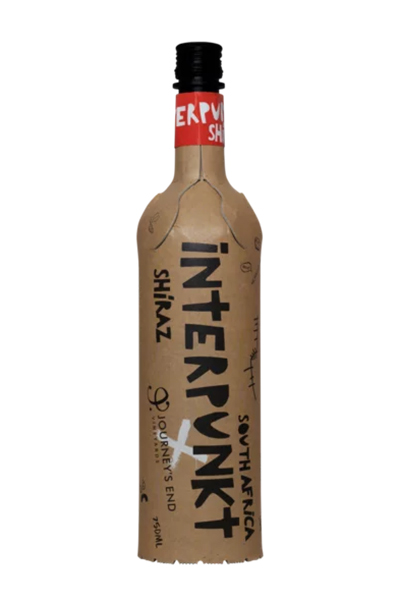
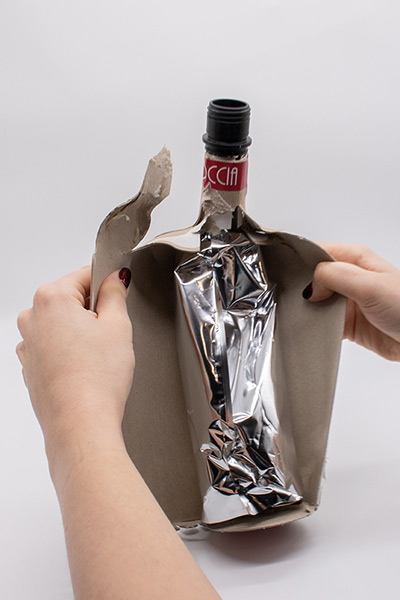
Pictured left: Journey’s End Interpunkt Shiraz; Image source: Checkers | Pictured right: Frugal Bottle; Image source: Frugalpac
Many local retailers are also encouraging consumers to make considered choices as the bevy of canned wines becomes increasingly popular across the board.
Tiny Keg Can Co., released a limited edition canned wine box in collaboration with six local labels and producers. Khayelitsha’s Finest Wines by Lindile Ndzaba, Kleine Zalze by RJ Botha, The Lekker Wine Kollective by Adi Badenhorst, Botanica Wines by Ginny Povall, Renegade Wines by Francois Haasbroek, and Salt Rock Wines by Alexander Grier formed part of the successful project.
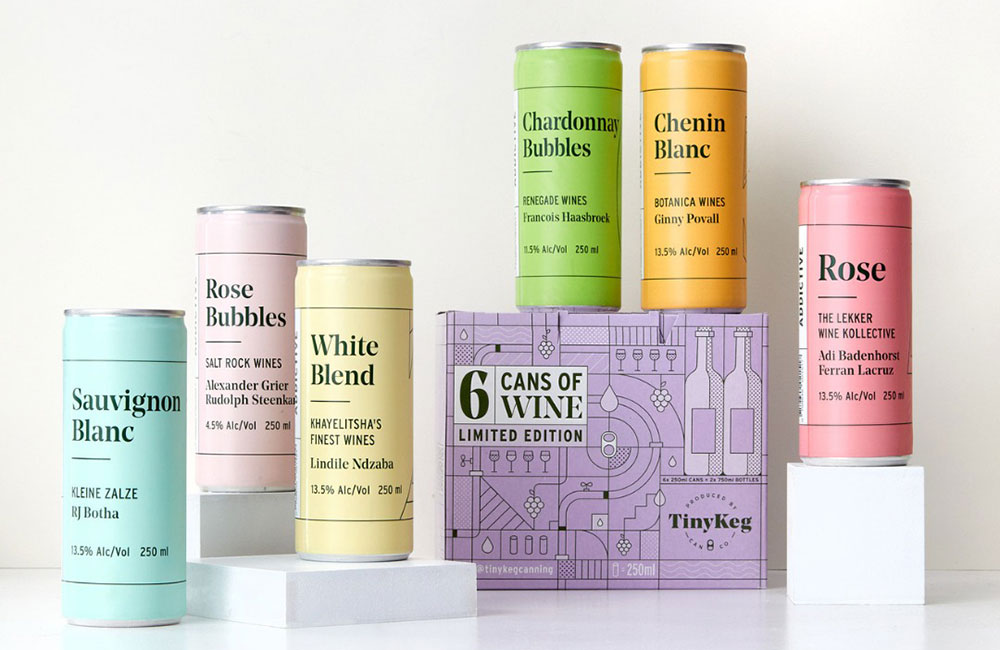 Pictured: Tiny Keg Can Co. limited edition canned wine box (Image source: Tiny Keg Can Co. Facebook).
Pictured: Tiny Keg Can Co. limited edition canned wine box (Image source: Tiny Keg Can Co. Facebook).
Local retailer Woolworths also recently announced a similar initiative in partnership with prominent wine estates, including Haute Cabrière, Kleine Zlaze, Beyerskloof, De Wetshof, Ken Forrester and Diemersdal. The canned wines, which come in a nifty pack of four, will join their trendy range of wine products.
These are just a few examples, but there is clearly a growing trend – one that signifies improved sustainability practices in the wine world. Though commonly associated with low-end labels, lighter bottle formats don’t impact the quality of wines, so we say less is more!
Want more? Meet Nongcebo Langa, Delheim Estate’s talented winemaker.
Hungry for more? Subscribe to our Newsletter

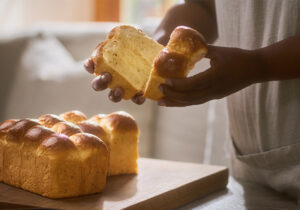
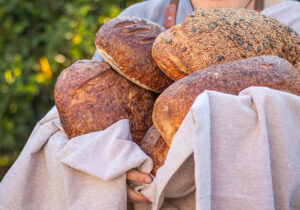

Warning: Undefined variable $required_text in /home/rxlgpodj/domains/test10.co.za/public_html/C/wp-content/themes/upBootstrap3/comments.php on line 107
Warning: Undefined variable $aria_req in /home/rxlgpodj/domains/test10.co.za/public_html/C/wp-content/themes/upBootstrap3/comments.php on line 123
Warning: Undefined variable $aria_req in /home/rxlgpodj/domains/test10.co.za/public_html/C/wp-content/themes/upBootstrap3/comments.php on line 129